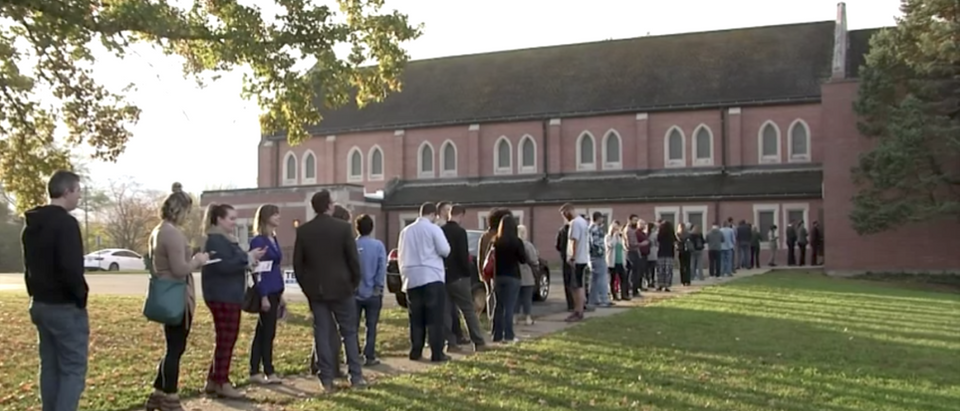Polling places are one of the few public spaces where First Amendment rights are significantly curtailed. Pamphleteering is often prohibited inside local precincts, an obvious infringement on the rights of speech and assembly. Many states have adopted laws banning photography at the polls, including so-called ballot selfies, that would seem to contravene the rights of expression and a free press.
The Supreme Court agreed to review one of the most stringent polling place regulations in the country Monday, a Minnesota law that forbids voters from wearing political apparel of any sort in or around a polling precinct.
The case, Minnesota Voters Alliance v. Mansky, was occasioned when Andrew Cilek, the executive director of the Minnesota Voters Alliance (MVA), was temporarily prevented from voting at his Hennepin County polling place in 2010. Cilek was wearing a tee-shirt featuring the Gadsden flag, which is closely associated with the Tea Party, and a button expressing support for voter identification laws. He was twice refused a ballot because of his partisan attire.
Minnesota state election law reads: “A political badge, political button, or other political insignia may not be worn at or about the polling place on primary or election day.” Cilek and the MVA challenged the provision, claiming it is overbroad and chills protected speech. Though tailored laws enjoining certain types of political expression and activity may pass constitutional muster, the MVA argues a categorical ban “punishes a substantial amount of protected free speech,” like political apparel addressing issues which are unrelated to a matter on the ballot.
A divided panel of the 8th U.S. Circuit Court of Appeals found for the state, concluded that a “speech-free zone” at polling places corresponds to the government’s legitimate interest in establishing “peace, order, and decorum” on election day.
Federal appeals courts have disagreed over the questions the MVA’s challenge presents. The 5th and D.C. Circuits previously ruled that state governments have broad powers to restrict First Amendment activities in and around voting precincts, while the 4th and 7th Circuits have struck down laws comparable to Minnesota’s. The Supreme Court is more likely to review a case involving a question over which multiple circuit courts disagree.
The high court has previously upheld state laws that ban politicking at the polling place. In a 1992 case called Burson v. Freeman, the Court ruled that Tennessee’s prohibition on distributing political materials within 100-feet of a precinct was constitutional, though the five-justice majority fractured as to reasoning. The justices have never elaborated as to how far the state’s power to restrict First Amendment activities near polling places extends.
The Pacific Legal Foundation, a conservative public interest law practice representing the MVA, says the Court now has the opportunity to make clear that voting precincts can’t be turned into speech-free zones.
“The state’s restrictions on voter apparel apply to any clothing that reflects personal values, even clothing with a message that is unrelated to anyone’s campaign,” said Wen Fa, counsel for the petitioners. “Such a limitless ban on personal expression is unconstitutional.”
The justices are likely to schedule argument in the case for early 2018.
Send tips to kevin@dailycallernewsfoundation.org.
All content created by the Daily Caller News Foundation, an independent and nonpartisan newswire service, is available without charge to any legitimate news publisher that can provide a large audience. All republished articles must include our logo, our reporter’s byline and their DCNF affiliation. For any questions about our guidelines or partnering with us, please contact licensing@dailycallernewsfoundation.org.












